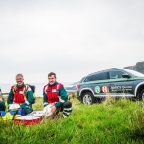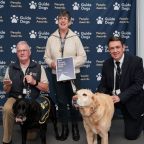
West Country residents support slow speed technology
Two thirds of people in the South West are in favour of mandatory speed controlling technology on commercial and public transport vehicles, a poll commissioned by Living Streets reveals today (13 August 2014) to mark 85 years since the organisation was first formed.
Intelligent Speed Adaptation (ISA) prevents a vehicle exceeding the speed limit. The YouGov survey found 66% of British adults in the region in favour of it being compulsory for public transport vehicles such as buses and coaches, and 71% in favour for commercial traffic such as lorries and vans. As more local authorities move towards 20 mph speed limits, ISA could be a useful tool to regulate traffic speeds and make streets safer for vulnerable road users, says the charity.
An early version of ISA was demonstrated over 80 years ago by the secretary of Living Streets – then called the Pedestrians’ Association - which held its first meeting on 13 August 1929.
Living Streets interim Chief Executive, Phillipa Hunt, said: “Over 80 years ago one of our founder members, Mr E S Cope, demonstrated his Tell Tale Lights system which alerted drivers and other road users when vehicles exceeded the speed limit. Bear in mind that when we were founded, there was no driving test, no pedestrian crossings and little regulation.
“In 1932, 40,000 children were injured on Britain’s roads and 1,200 lost their lives. Over the years, our campaigns for slower speed limits, safe crossing points and other measures to make walking on our streets safer and easier have helped to reduce this shocking toll, but 80 years later there were still 17,190 children injured and 61 child fatalities on our roads. As part of a package of measures including 20 mph speed limits where we live, work, shop and go to school, this technology can help to make our original vision of streets safe for walking a reality, and this poll shows that the public subscribe to that vision.”
During its 85-year history, Living Streets has successfully campaigned for compulsory speedometers on public vehicles, speed limits, pedestrian crossings, limits on alcohol consumption when driving and the introduction of the driving test.
Phillipa Hunt added: “Many prescient inventions which seemed left field at the time have become part of our everyday reality. Slower speeds make walking safer and easier for everyone whether we’re going to school, to work or to the shops.”

















